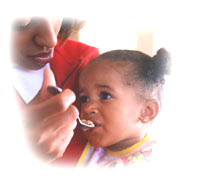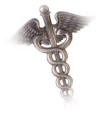 |
You can prevent
infection and help
keep your unborn baby safe. Here’s how:
- Wash your hands often with soap and water,
especially when…
|
 |
-
 Try not to
share forks, cups, and food with young children. Try not to
share forks, cups, and food with young children.
Wash your hands often when around children. Their saliva and
urine might contain a virus. It is likely harmless to them, but
it can be dangerous for you and your unborn baby. Click here to learn more
about this tip.
-
Cook your
meat until it’s well done.
The juices
should run clear and there should be no pink inside. Do not eat
hot dogs, luncheon meats, or deli meats, unless they are
reheated until steaming hot. These undercooked meats and
processed meats might contain harmful bacteria.
Click here to learn
more about
this tip.
- Avoid
unpasteurized (raw) milk and foods made from it.
 Do
not eat soft cheeses such as feta, brie, and queso fresco unless
they have labels that say they are pasteurized. Unpasteurized
products can contain harmful bacteria.
Click here to learn
more about this tip. Do
not eat soft cheeses such as feta, brie, and queso fresco unless
they have labels that say they are pasteurized. Unpasteurized
products can contain harmful bacteria.
Click here to learn
more about this tip.
-
Do not touch or change dirty cat litter.

Have someone else do it. If you must change the litter
yourself, be sure to wear gloves and wash your hands afterwards.
Dirty cat litter might contain a harmful parasite.
Click here to learn more
about this tip.
- Stay away from wild or pet rodents and their
droppings.
 Have
a pest control professional get rid of pests in or
around your home. If you have a pet rodent, like a
hamster or guinea pig, have someone else care for it
until after your baby arrives. Some rodents might carry
a harmful virus. Click here to learn more
about this tip. Have
a pest control professional get rid of pests in or
around your home. If you have a pet rodent, like a
hamster or guinea pig, have someone else care for it
until after your baby arrives. Some rodents might carry
a harmful virus. Click here to learn more
about this tip.
- Get tested for sexually transmitted diseases (STDs), such as
HIV and hepatitis B, and protect yourself from them.
Some people that have HIV,
hepatitis B, or an STD do not feel sick. Knowing if you have one
of these diseases is important. If you do, talk to your doctor
about how you can reduce the chance that your baby will become
sick.
Click
here to learn more about this tip.
- Talk to your doctor about vaccinations (shots).
 Some
are recommended before you become pregnant, during pregnancy, or
right after delivery. Having the right vaccinations at the right
time can help keep you healthy and help keep your baby from
getting very sick or having
life-long health problems.
Click here to learn more
about this tip. Some
are recommended before you become pregnant, during pregnancy, or
right after delivery. Having the right vaccinations at the right
time can help keep you healthy and help keep your baby from
getting very sick or having
life-long health problems.
Click here to learn more
about this tip.
- Avoid people
who have an infection.
Stay away
from people who you know have infections, such as chickenpox or
rubella, if you have not yet had it yourself or did not have the
vaccine before pregnancy.
Click
here to learn more about this
tip.
-
Ask your
doctor about group B strep.

About 1 in 4 women carry this type of bacteria, but do
not feel sick. An easy swab test near the end of pregnancy will
show if you have this type of
bacteria. If you do have group B strep, talk to your doctor
about how to protect your baby during
labor. Click here to learn more
about this tip.
These tips can help you prevent infections that could harm your
unborn baby. You won’t always know if you have an infection -
sometimes you won’t even feel sick. If you think you might have an
infection or think you are at risk, see your doctor.
This is not a complete guide to a healthy pregnancy. Be sure to talk
with your doctor to learn more about safe food preparation, wearing
insect repellent when outside, taking medicine, and other important
topics.
Date:
November 01, 2007
Content source: National Center on Birth Defects and Developmental
Disabilities
|
 |
|